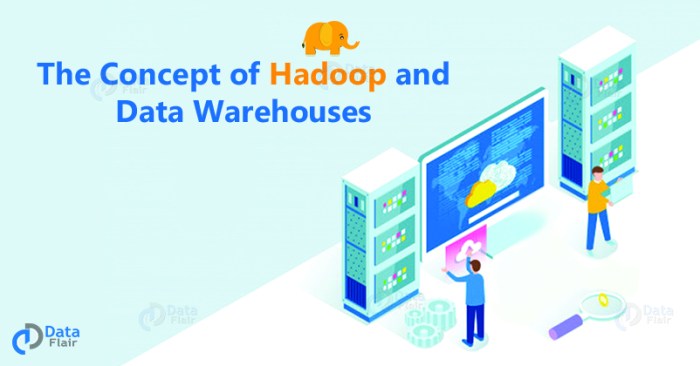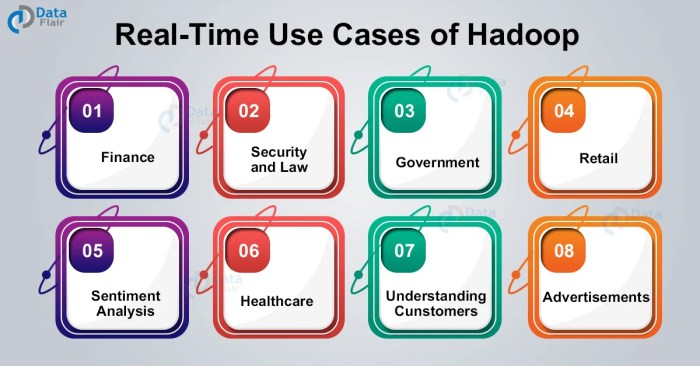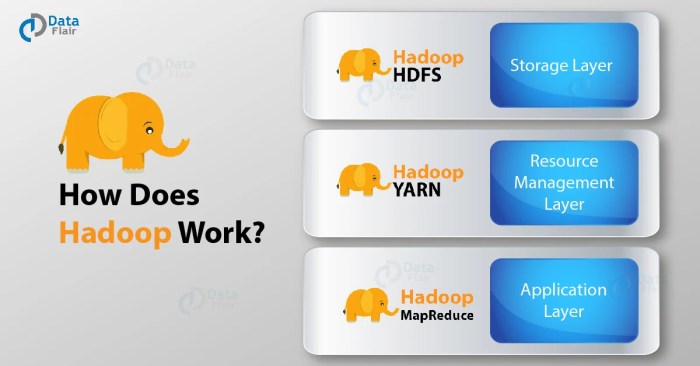In most cases hadoop is used to replace data warehouses – In the realm of data management, Hadoop has emerged as a formidable contender, challenging the traditional dominance of data warehouses. This article delves into the capabilities, use cases, and considerations associated with Hadoop’s potential to replace data warehouses, offering insights into its advantages and challenges.
Hadoop’s ability to handle vast data volumes, scalability, cost-effectiveness, and flexibility make it an attractive alternative to traditional data warehouses. Organizations across industries have successfully leveraged Hadoop to enhance their data management capabilities, reaping benefits such as improved data accessibility, reduced costs, and enhanced analytics.
Understanding Hadoop’s Role in Data Warehousing

Traditionally, data warehouses have been the cornerstone of data management, centralizing and organizing vast amounts of data for analysis and reporting. However, traditional data warehouses have limitations, including scalability, cost, and flexibility challenges.
Hadoop emerged as a potential replacement for data warehouses due to its ability to handle massive data volumes, its scalability, and its cost-effectiveness. Hadoop’s open-source nature and flexibility make it adaptable to various data warehousing needs.
Capabilities of Hadoop in Data Warehousing, In most cases hadoop is used to replace data warehouses
- Large Data Volume Handling:Hadoop’s distributed architecture enables it to process and store vast amounts of data, making it suitable for big data applications.
- Scalability and Cost-Effectiveness:Hadoop’s distributed architecture allows for seamless scaling by adding more nodes, providing cost-effective data warehousing solutions.
- Flexibility and Customization:Hadoop’s open-source nature and modular architecture offer flexibility and customization options, allowing organizations to tailor their data warehouses to specific requirements.
Use Cases of Hadoop in Data Warehousing
| Industry | Organization | Benefits Achieved |
|---|---|---|
| Retail | Amazon | Improved customer insights, personalized recommendations, and fraud detection |
| Finance | JPMorgan Chase | Risk assessment, fraud detection, and compliance reporting |
| Healthcare | CERN | Data analysis for particle physics experiments, leading to scientific discoveries |
Challenges and Considerations
- Technical Complexity:Implementing and managing Hadoop requires skilled professionals and appropriate infrastructure, which can be challenging for organizations.
- Data Quality and Integration:Ensuring data quality and seamless integration with existing systems can be complex in Hadoop environments.
- Performance Optimization:Optimizing Hadoop performance for specific data warehousing workloads requires careful tuning and expertise.
Best Practices for Hadoop Data Warehousing
- Data Integration:Use data integration tools and techniques to seamlessly integrate data from various sources into the Hadoop data warehouse.
- Data Quality Management:Establish data quality processes to ensure the accuracy and consistency of data in the data warehouse.
- Performance Optimization:Optimize Hadoop performance through techniques such as data partitioning, data compression, and resource allocation.
Query Resolution: In Most Cases Hadoop Is Used To Replace Data Warehouses
Is Hadoop a complete replacement for traditional data warehouses?
While Hadoop offers significant advantages, it may not be a complete replacement for all data warehousing needs. Traditional data warehouses still excel in certain scenarios, such as handling structured data or supporting real-time queries.
What are the key challenges of replacing data warehouses with Hadoop?
Transitioning to Hadoop requires careful planning and execution. Challenges include data integration, data quality management, skilled professional availability, and ensuring adequate infrastructure to support Hadoop implementations.
How can organizations ensure a successful Hadoop data warehousing implementation?
Following best practices is crucial for successful Hadoop data warehousing projects. These include architecting for scalability, data integration, data quality management, performance optimization, and ongoing maintenance and support.

